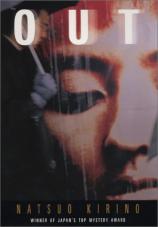Out
Review
Out
The story behind OUT is almost as interesting as the novel itself. OUT is the debut novel of Natsuo Kirino; published in 1998 in Japan, and garnering not only awards but also popular accolades, it has only recently seen publication here. Kirino has since gone on to become recognized as Japan's preeminent mystery novelist. Her second novel, SOFT CHEEKS, won the Naoki Prize for literature in 1999 and is scheduled for publication in the United States shortly. Aided by a fine translation by Stephen Snyder, OUT is a dark tale, occasionally relieved by grim humor that transcends cultural differences to tell a riveting story of revenge, betrayal and renewal.
OUT revolves around four women working in a food processing factory, preparing box lunches on an assembly line, performing physically challenging and mentally boring work while they struggle to stay financially and emotionally afloat. Masako Katori is perhaps the best off financially of the four, though she shares a household with a husband who is more like a distant brother and an uncommunicative teenage son who is, in his sullen silence, a total stranger. Yayoi Yamamoto is married to Kenji, an abusive layabout who fritters away his wife's salary and their meager savings in a clandestine baccarat room while showering a prostitute with unrequited love. Kuniko Jonouchi is kind of an odd duck in the group, all flash and no substance, living far beyond her means while she uses clothes and makeup as a quick fix for her physical and emotional unattractiveness. Yoshie Azuma, known as "Skipper" at the factory, is the oldest of the four and is perhaps the most trapped by circumstance. A widow, she is the sole support and caregiver of her invalid mother-in-law and poorly dispositioned teenage daughter.
The four women are dramatically brought together in a new way when Yamamoto, in a sudden fit of anger, murders Kenji. Yamamoto turns to Katori to dispose of the body. Katori, in turn, seeks the assistance of Azuma in doing so. Jonouchi is brought into the mix when she unexpectedly visits Katori while Katori and Azuma are in the process of preparing Yamamoto's diseased husband's body for disposal. Kirino does not flinch from graphic description, and OUT should by no means be mistaken for a "cozy." Kirino infuses the women with a sense of purpose, and while they bring a varying degree of dedication to the task at hand, each is able to bring enough frustration with her respective situation to the fore to get the job done.
It is only Yamamoto, whose act of passion was the catalyst for the conspiracy of concealment, who is ultimately unable to participate in the disposal of the body and who displays the most remorse. Janouchi's poor execution of her task results in Kenji's body --- or at least part of it --- being discovered. Satake, a psychotic mobster and owner of the baccarat club, which Kenji frequented, is suspected of the murder. Satake, although eventually cleared, loses everything and seeks revenge by attempting to target the real killer --- whom he suspects to be Yamamoto. His pursuit results in a catalytic ending that will leave the lives of the four women changed forever.
Kirino, as is the case with the best of mystery writers, combines a strong plot with a canny description of contemporary Japanese mores and culture to make this an unforgettable work. While OUT was initially slow to attract literary attention in the United States, the gradual critical attention and word of mouth that it has achieved will undoubtedly result in much-deserved popularity. This is a novel that will be shared, and discussed, for some time to come.
Reviewed by Joe Hartlaub on July 10, 2003



